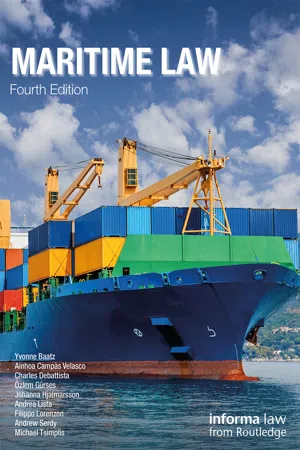
- 578 pages
- English
- ePUB (mobile friendly)
- Available on iOS & Android
Maritime Law
About this book
Now in its fourth edition, this authoritative guide covers all of the core aspects of maritime law in one distinct volume. Maritime Law is written by a team of leading academics and practitioners, each expert in their own field. Together, they provide clear, concise and fully up-to-date coverage of topics ranging from bills of lading to arrest of ships, all written in an accessible and engaging style. As English law is heavily relied on throughout the maritime world, this book is grounded in English law whilst continuing to analyse the key international conventions currently in force.
Brand new coverage includes:
- The entry into force of the Hague Convention on Choice of Court Agreements, 2005 and greater detail on Regulation (EU) No 1215/2012 of the European Parliament and of the Council of 12 December 2012 on jurisdiction and the recognition and enforcement of judgments in civil and commercial matters (recast).
-
- The entry into force of the Nairobi International Convention on the Removal of Wrecks, 2007.
-
- Discussion on the Arctic Sunrise and Duzgit Integrity arbitrations and the "Enrica Lexie" Incident (Italy v India), Provisional Measures in the International Tribunal for the Law of the Sea.
-
- Analysis of the Insurance Act 2015.
-
- Comment on recent cases including London Steam Ship Owners Mutual Insurance Association Ltd v Spain (The Prestige) and PST Energy 7 Shipping LLC v OW Bunker Malta Ltd (The Res Cogitans).
-
This book is a comprehensive reference source for students, academics and legal practitioners worldwide, especially those new to maritime law or a particular field therein.
Tools to learn more effectively

Saving Books

Keyword Search

Annotating Text

Listen to it instead
Information
Chapter 1
The conflict of laws
- 1. Introduction
- 2. Arbitration
- (a) Valid arbitration agreement
- (b) Anti-suit injunction
- (i) Anti-suit injunctions and the Jurisdiction Regulation
- (ii) Anti-suit injunctions and the Recast Jurisdiction Regulation
- (c) Damages for breach of the arbitration agreement
- (d) Recognition and enforcement
- 3. Court jurisdiction
- (a) The 2005 Hague Convention on Choice of Court Agreements
- (b) The Recast Jurisdiction Regulation and the Jurisdiction Regulation
- (i) A jurisdiction clause
- (ii) Multiple proceedings
- (iii) Related actions
- (iv) No jurisdiction clause
- (v) Contract claims
- (vi) Tort claims
- (vii) Agency
- (viii) Remuneration for salvage of cargo or freight
- (ix) Multiple defendants
- (x) Third party proceedings
- (xi) Limitation
- (xii) Other international conventions
- (c) Common law
- (i) Forum non conveniens
- (ii) Jurisdiction agreement
- (iii) Tonnage limitation
- (d) Anti-suit injunctions
- (e) Damages for breach of a jurisdiction agreement
- 4. Governing law
- (a) Rome I
- (i) The scope of Rome I
- (ii) Freedom of choice
- (iii) Limits on party choice
- (iv) Provisions which cannot be derogated from by agreement in a domestic contract
- (v) Community law in a domestic contract
- (vi) Overriding mandatory provisions
- (vii) Public policy
- (viii) International conventions
- (ix) Community law
- (x) No choice
- (b) The common law
- (c) Rome II
- (i) Freedom of choice
- (ii) Provisions which cannot be derogated from by agreement in a domestic contract
- (iii) Community law in a domestic contract
- (iv) Overriding mandatory provisions
- (v) Public policy
- (vi) Community law
- (vii) International conventions
- (d) Sections 9 to 15 of the Private International Law (Miscellaneous Provisions) Act 1995
- (a) Rome I
1. Introduction
2. Arbitration
(a) Valid arbitration agreement
Table of contents
- Cover
- Half Title
- Title
- Copyright
- Contents
- List of illustrations
- Preface to the fourth edition
- Preface to the third edition
- Preface to the second edition
- Preface to Southampton on Shipping Law (2008)
- Authors’ biographies
- Table of cases
- Table of legislation, Conventions and rules
- Chapter 1: The conflict of laws
- Chapter 2: Shipbuilding, sale, finance and registration
- Chapter 3: International trade and shipping documents
- Chapter 4: Charterparties
- Chapter 5: Cargo claims and bills of lading
- Chapter 6: Carriage of passengers
- Chapter 7: The liabilities of the vessel
- Chapter 8: Public international law aspects of shipping regulation
- Chapter 9: Safety and compliance
- Chapter 10: Marine pollution from shipping activities
- Chapter 11: Marine insurance
- Chapter 12: Procedures for enforcement
- Chapter 13: The application of the EU competition rules to the marine sector
- Bibliography
- Index
Frequently asked questions
- Essential is ideal for learners and professionals who enjoy exploring a wide range of subjects. Access the Essential Library with 800,000+ trusted titles and best-sellers across business, personal growth, and the humanities. Includes unlimited reading time and Standard Read Aloud voice.
- Complete: Perfect for advanced learners and researchers needing full, unrestricted access. Unlock 1.4M+ books across hundreds of subjects, including academic and specialized titles. The Complete Plan also includes advanced features like Premium Read Aloud and Research Assistant.
Please note we cannot support devices running on iOS 13 and Android 7 or earlier. Learn more about using the app